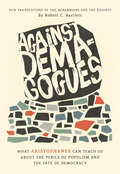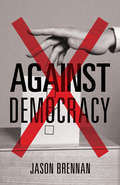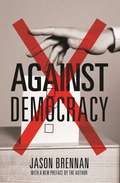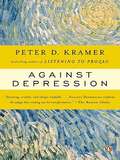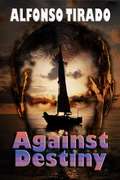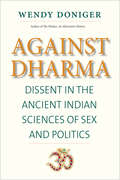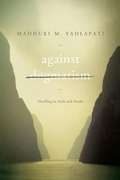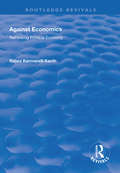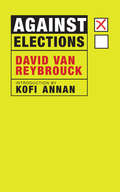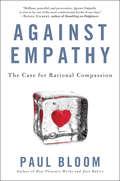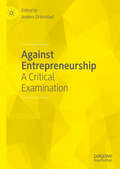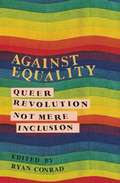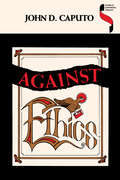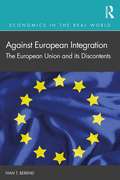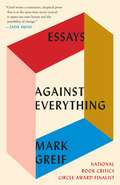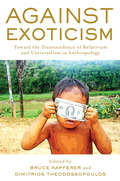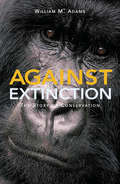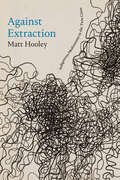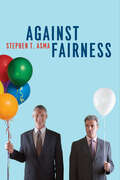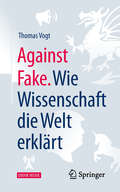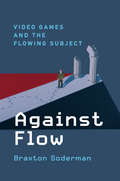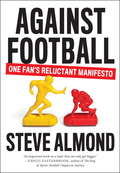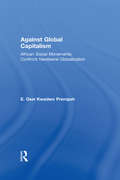- Table View
- List View
Against Demagogues: What Aristophanes Can Teach Us about the Perils of Populism and the Fate of Democracy, New Translations of the Acharnians and the Knights
by Prof. Robert C. BartlettTimeless comedies on resisting tyranny from one of history’s greatest comic playwrights. Against Demagogues presents Robert C. Bartlett's new translations of Aristophanes' most overtly political works, the Acharnians and the Knights. In these fantastically inventive, raucous, and raunchy comedies, the powerful politician Cleon proves to be democracy's greatest opponent. With unrivalled power, both plays make clear the dangers to which democracies are prone, especially the threats posed by external warfare, internal division, and class polarization. Combating the seductive allure of demagogues and the damage they cause, Against Demagogues disentangles Aristophanes' serious teachings from his many jokes and pratfalls, substantiating for modern readers his famous claim to "teach justice" while "making a comedy" of the city. The book features an interpretive essay for each play, expertly guiding readers through the most important plot points, explaining the significance of various characters, and shedding light on the meaning of the plays' often madcap episodes. Along with a contextualizing introduction, Bartlett offers extensive notes explaining the many political, literary, and religious references and allusions. Aristophanes' comedic skewering of the demagogue and his ruthless ambition—and of a community so ill-informed about the doings of its own government, so ready to believe in empty promises and idle flattery—cannot but resonate strongly with readers today around the world.
Against Democracy
by Jason BrennanMost people believe democracy is a uniquely just form of government. They believe people have the right to an equal share of political power. And they believe that political participation is good for us--it empowers us, helps us get what we want, and tends to make us smarter, more virtuous, and more caring for one another. These are some of our most cherished ideas about democracy. But, Jason Brennan says, they are all wrong.In this trenchant book, Brennan argues that democracy should be judged by its results--and the results are not good enough. Just as defendants have a right to a fair trial, citizens have a right to competent government. But democracy is the rule of the ignorant and the irrational, and it all too often falls short. Furthermore, no one has a fundamental right to any share of political power, and exercising political power does most of us little good. On the contrary, a wide range of social science research shows that political participation and democratic deliberation actually tend to make people worse--more irrational, biased, and mean. Given this grim picture, Brennan argues that a new system of government--epistocracy, the rule of the knowledgeable--may be better than democracy, and that it's time to experiment and find out.A challenging critique of democracy and the first sustained defense of the rule of the knowledgeable, Against Democracy is essential reading for scholars and students of politics across the disciplines.
Against Democracy: New Preface
by Jason BrennanMost people believe democracy is a uniquely just form of government. They believe people have the right to an equal share of political power. And they believe that political participation is good for us—it empowers us, helps us get what we want, and tends to make us smarter, more virtuous, and more caring for one another. These are some of our most cherished ideas about democracy. But Jason Brennan says they are all wrong.In this trenchant book, Brennan argues that democracy should be judged by its results—and the results are not good enough. Just as defendants have a right to a fair trial, citizens have a right to competent government. But democracy is the rule of the ignorant and the irrational, and it all too often falls short. Furthermore, no one has a fundamental right to any share of political power, and exercising political power does most of us little good. On the contrary, a wide range of social science research shows that political participation and democratic deliberation actually tend to make people worse—more irrational, biased, and mean. Given this grim picture, Brennan argues that a new system of government—epistocracy, the rule of the knowledgeable—may be better than democracy, and that it's time to experiment and find out.A challenging critique of democracy and the first sustained defense of the rule of the knowledgeable, Against Democracy is essential reading for scholars and students of politics across the disciplines. Featuring a new preface that situates the book within the current political climate and discusses other alternatives beyond epistocracy, Against Democracy is a challenging critique of democracy and the first sustained defense of the rule of the knowledgeable.
Against Depression
by Peter D. KramerIn his landmark bestseller Listening to Prozac, Peter Kramer revolutionized the way we think about antidepressants and the culture in which they are so widely used. Now Kramer offers a frank and unflinching look at the condition those medications treat: depression. Definitively refuting our notions of "heroic melancholy," he walks readers through groundbreaking new research—studies that confirm depression's status as a devastating disease and suggest pathways toward resilience. Thought-provoking and enlightening, Against Depression provides a bold revision of our understanding of mood disorder and promises hope to the millions who suffer from it. .
Against Destiny: Life does not end with death.
by Alfonso TiradoAntonio Carrales, coming back after having visited Doña Leonor, his mother (in the novel La Dama del Silencio, from the same author), in Mexico City, with a deep pain in his soul by the sad omen that he will never see her again, returns to his life in New York City. The story tells part of the life of Antonio, historical researcher, navigator of dreams and a passionate writer, and in parallel, it’s the story of the adventures of an ambitious Spaniard, traveling to San Francisco, attracted by the discovery of the gold deposits in the 1850's. The route to get to San Francisco on the Atlantic side was crossing through Nicaragua. As soon as he disembarks, Diego Ruelas, amazed by the tropical exuberance, changes his plans, stays in Nicaragua and in a short time falls in love, head over heels with a beautiful native girl. They live in the years of tyranny by the freebooter William Walker. His wife and their son disappear when the slave hunt is unleashed. Diego Ruelas, after a tireless search for his family, gives up and totally beaten decides to return to Spain. During the voyage back, the ship is struck by a storm and he dies. Antonio Carrales sinks into the abyss of disappointed love and decides to take a long trip on his sail boat. He is caught by a storm and the ship is destroyed. When he wakes up he doesn’t remember anything about where or who he is. They rescue him, but because of his attitude towards the Coast Guard, they wonder if he has suffered any brain damage that causes him amnesia, and it gets worse, when they discover that he pretends to be someone else, someone who doesn’t correspond to the papers that identify him as Antonio Carrales and he insists on calling himself Diego Ruelas. The case is assigned by the hospital to a doctor in psychology. Things get even more complicated when she falls in love with her patient during the process of clarifying his identity. They manage, with the intervention of a hypnotist and researcher
Against Dharma: Dissent in the Ancient Indian Sciences of Sex and Politics (The Terry Lectures Series)
by Wendy DonigerAn esteemed scholar of Hinduism presents a groundbreaking interpretation of ancient Indian texts and their historic influence on subversive resistance Ancient Hindu texts speak of the three aims of human life: dharma,artha, and kama. Translated, these might be called religion, politics, and pleasure, and each is held to be an essential requirement of a full life. Balance among the three is a goal not always met, however, and dharma has historically taken precedence over the other two qualities in Hindu life. Here, historian of religions Wendy Doniger offers a spirited and close reading of ancient Indian writings, unpacking a long but unrecognized history of opposition against dharma. Doniger argues that scientific disciplines (shastras) have offered lively and continuous criticism of dharma, or religion, over many centuries. She chronicles the tradition of veiled subversion, uncovers connections to key moments of resistance and voices of dissent throughout Indian history, and offers insights into the Indian theocracy’s subversion of science by religion today.
Against Dogmatism: Dwelling in Faith and Doubt
by Madhuri M. YadlapatiMany contemporary discussions of religion take an absolute, intractable approach to belief and non-belief, which privileges faith and dogmatism while treating doubt as a threat to religious values. As Madhuri M. Yadlapati demonstrates, however, there is another way: a faith (or non-faith) that embraces doubt and its potential for exploring both the depths and heights of spiritual reflection and speculation. Through three distinct discussions of faith, doubt, and hope, Yadlapati explores what it means to live creatively and responsibly in the everyday world as limited, imaginative, and questioning creatures. She begins with a perceptive survey of diverse faith experiences in Islam, Buddhism, Judaism, Hinduism, and Protestant Christianity, then narrows her focus to Protestant Christianity and Hinduism to explore how the great thinkers of those faiths have embraced doubt in the service of spiritual transcendence. Defending the rich tapestry of faith and doubt against polarization, Against Dogmatism reveals a spiritual middle way, an approach native to the long-standing traditions in which faith and doubt are interwoven in constructive and dynamic ways.
Against Ecological Sovereignty: Ethics, Biopolitics, and Saving the Natural World (Posthumanities)
by Mick SmithAgainst Ecological Sovereignty is a passionate defense of radical ecology that speaks directly to current debates concerning the nature, and dangers, of sovereign power. Engaging the work of Bataille, Arendt, Levinas, Nancy, and Agamben, among others, Mick Smith reconnects the political critique of sovereign power with ecological considerations, arguing that ethical and political responsibilities for the consequences of our actions do not end with those defined as human.Against Ecological Sovereignty is the first book to turn Agamben&’s analysis of sovereignty and biopolitics toward an investigation of ecological concerns. In doing so it exposes limits to that thought, maintaining that the increasingly widespread biopolitical management of human populations has an unrecognized ecological analogue—reducing nature to a &“resource&” for human projects. Smith contends that a radical ecological politics must resist both the depoliticizing exercise of sovereign power and the pervasive spread of biopolitics in order to reveal new possibilities for creating healthy human and nonhuman communities.Presenting a stinging critique of human claims to sovereignty over the natural world, Smith proposes an alternative way to conceive of posthumanist ecological communities—one that recognizes the utter singularity of the beings in them.
Against Economics: Rethinking Political Economy (Routledge Revivals)
by Rajani Kannepalli KanthPublished in 1997, this postmodern critique provides a discourse on internal dynamics of the economics world view, suggesting for future societal wellbeing that we simply do not criticize economics but dispense it altogether. It argues that in the modern era economics have become obsolete as we live in a society riddled with corruption.
Against Elections: The Case For Democracy
by Kofi Annan David Van ReybrouckA small book with great weight and urgency to it, this is both a history of democracy and a clarion call for change."Without drastic adjustment, this system cannot last much longer," writes Van Reybrouck, regarded today as one of Europe's most astute thinkers. "If you look at the decline in voter turnout and party membership, and at the way politicians are held in contempt, if you look at how difficult it is to form governments, how little they can do and how harshly they are punished for it, if you look at how quickly populism, technocracy and anti-parliamentarianism are rising, if you look at how more and more citizens are longing for participation and how quickly that desire can tip over into frustration, then you realize we are up to our necks." Not so very long ago, the great battles of democracy were fought for the right to vote. Now, Van Reybrouck writes, "it's all about the right to speak, but in essence it's the same battle, the battle for political emancipation and for democratic participation. We must decolonize democracy. We must democratize democracy." As history, Van Reybrouck makes the compelling argument that modern democracy was designed as much to preserve the rights of the powerful and keep the masses in line, as to give the populace a voice. As change-agent, Against Elections makes the argument that there are forms of government, what he terms sortitive or deliberative democracy, that are beginning to be practiced around the world, and can be the remedy we seek. In Iceland, for example, deliberative democracy was used to write the new constitution. A group of people were chosen by lot, educated in the subject at hand, and then were able to decide what was best, arguably, far better than politicians would have. A fascinating, and workable idea has led to a timely book to remind us that our system of government is a flexible instrument, one that the people have the power to change.
Against Empathy: The Case for Rational Compassion
by Paul BloomWe often think of our capacity to experience the suffering of others as the ultimate source of goodness. Many of our wisest policy-makers, activists, scientists, and philosophers agree that the only problem with empathy is that we don't have enough of it.Nothing could be farther from the truth, argues Yale researcher Paul Bloom. In AGAINST EMPATHY, Bloom reveals empathy to be one of the leading motivators of inequality and immorality in society. Far from helping us to improve the lives of others, empathy is a capricious and irrational emotion that appeals to our narrow prejudices. It muddles our judgment and, ironically, often leads to cruelty. We are at our best when we are smart enough not to rely on it, but to draw instead upon a more distanced compassion. Basing his argument on groundbreaking scientific findings, Bloom makes the case that some of the worst decisions made by individuals and nations--who to give money to, when to go to war, how to respond to climate change, and who to imprison--are too often motivated by honest, yet misplaced, emotions. With precision and wit, he demonstrates how empathy distorts our judgment in every aspect of our lives, from philanthropy and charity to the justice system; from medical care and education to parenting and marriage. Without empathy, Bloom insists, our decisions would be clearer, fairer, and--yes--ultimately more moral.Brilliantly argued, urgent and humane, AGAINST EMPATHY shows us that, when it comes to both major policy decisions and the choices we make in our everyday lives, limiting our impulse toward empathy is often the most compassionate choice we can make.
Against Entrepreneurship: A Critical Examination
by Anders ÖrtenbladThis book explores whether there is reason to be against entrepreneurship. Just like literature on the darker sides of entrepreneurs and entrepreneurship, the book is an answer to the one-sided, overly positive and uncritical image of entrepreneurship. The “twist” in this book, in comparison with literature on dark sides of entrepreneurship, is to explore being against entrepreneurship. From various perspectives such as lexical semantics, Marxism, philosophy of science and psychology, the contributors contemplate on why there may be reason to be against entrepreneurship discourse as well as entrepreneurship practice. Some chapters are based on first-hand empirical data, others are conceptual. The main overall conclusion is that there are some strong arguments for being against entrepreneurship discourse, as well as for being against certain aspects of entrepreneurship practice. Before it is reasonable to be against entrepreneurship practice in total, a convincing and practicable alternative needs to be developed. This book will be valuable reading for entrepreneurship scholars, as well as academics working in the fields of business ethics, (critical) management, and international business.
Against Equality
by Ryan ConradWhen "rights" go wrong.Does gay marriage support the right-wing goal of linking access to basic human rights like health care and economic security to an inherently conservative tradition?Will the ability of queers to fight in wars of imperialism help liberate and empower LGBT people around the world?Does hate-crime legislation affirm and strengthen historically anti-queer institutions like the police and prisons rather than dismantling them? The Against Equality collective asks some hard questions. These queer thinkers, writers, and artists are committed to undermining a stunted conception of "equality." In this powerful book, they challenge mainstream gay and lesbian struggles for inclusion in elitist and inhumane institutions. More than a critique, Against Equality seeks to reinvigorate the queer political imagination with fantastic possibility! "In an era when so much of the lesbian and gay movement seems to echo the rhetoric of the mainstream Establishment, the work of Against Equality is an important provocation and corrective.... I hope this book is read widely, particularly by the people who will most disagree with it; in the tradition of the great political pamphleteers, this collection should spark debate around some of the key issues for our movement." -Dennis Altman, author of Homosexual: Oppression & Liberation "Against Equality issues a radical call for social transformation. Against and beyond the "holy trinity" of pragmatic gay politics-marriage, militarism, and prison-the queer and trans voices archived in this collection offer a radical left critique of neoliberalism, capitalism, and state oppression. In a format accessible and enlivening, equally at home in the classroom and on the street, this book keeps our political imaginations alive. Prepare to be challenged, educated, and inspired." -Margot Weiss, author of Techniques of Pleasure
Against Equality: Queer Revolution, Not Mere Inclusion
by Ryan ConradWhen “rights” go wrong.<P> Does gay marriage support the right-wing goal of linking access to basic human rights like health care and economic security to an inherently conservative tradition?<P> Will the ability of queers to fight in wars of imperialism help liberate and empower LGBT people around the world?<P> Does hate-crime legislation affirm and strengthen historically anti-queer institutions like the police and prisons rather than dismantling them?<P> The Against Equality collective asks some hard questions. These queer thinkers, writers, and artists are committed to undermining a stunted conception of “equality.” In this powerful book, they challenge mainstream gay and lesbian struggles for inclusion in elitist and inhumane institutions. More than a critique, Against Equality seeks to reinvigorate the queer political imagination with fantastic possibility!
Against Ethics: Contributions to a Poetics of Obligation with Constant Reference to Deconstruction (Studies in Continental Thought)
by John D. CaputoA brilliant and witty postmodern critique of ethics, framed as a contemporary restaging of Kierkegaard’s Fear and Trembling.John D. Caputo undertakes a passionate, poetic, and satiric search for the basis of an ethics in the postmodern situation. Restaging Kierkegaard’s Fear and Trembling, Caputo defends the notion of obligation without ethics, of responsibility without the support of ethical foundations. Retelling the story of Abraham and Isaac, he strikes the pose of a postmodern-day Johannes de Silentio, accompanied by communications from such startling figures as Johanna de Silentio, Felix Sineculpa, and Magdalena de la Cruz. In dialogue with the thought of Kierkegaard, Nietzsche, Derrida, and Lyotard, Caputo forges a challenging, original account of what is possible and what is not possible for a continentalist ethics today.“Against Ethics is a bold work. . . . A counterethics whose multiple voices will be heard long after the trivializing arguments of many analytic ethicists have vanished and the arcane formulations of many postmoderns have been jettisoned.” —Edith Wyschogrod“Caputo provides a brilliant new analysis of the limits of ethics. . . . Essential reading for anyone concerned with the philosophical issues raised in postmodernity.” —Drucilla Cornell“One of the most important works on philosophical ethics written in recent years. . . . Caputo speaks with a passion and concern that are rare in academic philosophy.” —Mark C. Taylor“Against Ethics is beautifully written, clever, learned, thought-provoking, and even inspiring.” —Theological Studies“Writing in the form of his ideas, Caputo offers the reader a truly exquisite reading experience. . . . His iconic style mirrors a truly refreshing honesty that draws the reader in to play.” —Quarterly Journal of Speech
Against European Integration: The European Union and its Discontents (Economics in the Real World)
by Ivan T. BerendThis book gives a complex description and discussion of today’s populist attacks against the European Union (EU) following the financial crisis of 2008, which opened the floodgates of dissatisfaction, and the migration crisis which destabilized the traditional solidarity basis of the EU. The problem of Brexit is also explored. Each chapter presents one of the main elements of the crisis of the EU. These include West European populism, Central European right-wing populism in power, and the exploitation of the EU’s mistake during the migration crisis of the mid-2010s. These also include the discovery of Christian ideology against immigration and hidden anti-Semitic propaganda using a hysterical attack against the liberal billionaire philanthropist George Soros, and Brexit. There is a detailed discussion of the failures of the EU to pacify the neighbourhood in the South and North, especially in Ukraine, and the rising hostile outside enemies of the EU, including Russia and Turkey, bad relationships with Trump’s America, the uncertainty of NATO, and the emergence of a new rival, China, that enters into the Central European edge of the EU. The author explores strategies for coping with, and emerging from, this existential crisis and ends with the alternative plans and possibilities for the future of the eurozone. This will be an invaluable resource for understanding the crisis of the EU, one of the central questions of contemporary international politics for undergraduate and graduate students, and readers interested in the discussion surrounding an endangered European integration and difficult world politics.
Against Everything: Essays
by Mark GreifA brilliant collection of critical essays by a young writer who is already a star in the intellectual firmament. As William Deresiewicz has written in Harper's Magazine, "[Mark Greif] is an intellectual, full stop...There is much of [Lionel] Trilling in Greif...Much also of Susan Sontag...What he shares with both, and with the line they represent, is precisely a sense of intellect--of thought, of mind--as a conscious actor in the world." Over the past eleven years, Greif has been publishing superb, and in some cases already famous, essays in n+1, the high-profile little magazine that he co-founded. These essays address such key topics in the cultural, political, and intellectual life of our time as the tyranny of exercise, the tyranny of nutrition and food snobbery, the sexualization of childhood (and everything else), the philosophical meaning of Radiohead, the rise and fall of the hipster, the impact of the Occupy Wall Street movement, and the crisis of policing. Four of the selections address, directly and unironically, the meaning of life--what might be the right philosophical stance to adopt toward one's self and the world. Each essay in Against Everything is learned, original, highly entertaining, and, from start to finish, dead serious. They are the work of a young intellectual who, with his peers, is reinventing and reinvigorating what intellectuals can be and say and do. Mark Greif manages to reincarnate and revivify the thought and spirit of the greatest of American dissenters, Henry David Thoreau, for our time and historical situation.From the Hardcover edition.
Against Exoticism: Toward the Transcendence of Relativism and Universalism in Anthropology
by Bruce Kapferer Dimitrios TheodossopoulosAnthropology begins in the encounter with the 'exotic': what stands outside of-and challenges-conventional or established understandings. This volume confronts the distortions of orientalism, ethnocentrism, and romantic nostalgia to expose exoticism, defined as the construction of false and unsubstantiated difference. Its aim is to re-found the importance of the exotic in the development of anthropological knowledge and to overcome methodological dualisms and dualistic approaches. Chapters look at the risk of exoticism in the perspectivist approach, the significant exotic corrective of Lévi-Strauss vis-à-vis an imperializing Eurocentrism, our nostalgic relationship with the ethnographic record, and the attempts of local communities to readapt previous exoticized referents, renegotiate their identity, and 'counter-exoticize.' This volume demonstrates a range of approaches that will be valuable for researchers and students seeking to effectively establish comparative methodological frameworks that transcend issues of relativism and universalism.
Against Extinction: The Story of Conservation
by William Bill Adams'Conservation in the 21st century needs to be different and this book is a good indicator of why.' Bulletin of British Ecological Society Against Extinction tells the history of wildlife conservation from its roots in the 19th century, through the foundation of the Society for the Preservation of the Wild Fauna of the Empire in London in 1903 to the huge and diverse international movement of the present day. It vividly portrays conservation's legacy of big game hunting, the battles for the establishment of national parks, the global importance of species conservation and debates over the sustainable use of and trade in wildlife. Bill Adams addresses the big questions and ideas that have driven conservation for the last 100 years: How can the diversity of life be maintained as human demands on the Earth expand seemingly without limit? How can preservation be reconciled with human rights and the development needs of the poor? Is conservation something that can be imposed by a knowledgeable elite, or is it something that should emerge naturally from people's free choices? These have never been easy questions, and they are as important in the 21st century as at any time in the past. The author takes us on a lively historical journey in search of the answers.
Against Extraction: Indigenous Modernism in the Twin Cities
by Matt HooleyIn Against Extraction Matt Hooley traces a modern tradition of Ojibwe invention in Minneapolis and St. Paul from the mid-nineteenth century to the present as that tradition emerges in response to the cultural legacies of US colonialism. Hooley shows how Indigenous literary and visual art modernisms challenge the strictures of everyday life and question the ecological, political, and cultural fantasies that make multivalent US colonialism seem inevitable. Hooley analyzes literature and art by Louise Erdrich, William Whipple Warren, David Treuer, George Morrison, and Gerald Vizenor in relation to histories of Indigenous dispossession and occupation, enslavement and Black life, and environmental harm and care. He shows that historical narratives of these cities are intimately bound up with the violence of colonial systems of extraction and that concepts like Indigeneity and sovereignty extend beyond treaty-granted promises of political control. These works, created in opposition and proximity to the extraction of cultural, political, and territorial resources, demonstrate how Indigenous claims to life and land matter to rethinking and unmaking the social and ecological devastations of the colonial world.
Against Fairness
by Stephen T. Asma“Mr. Asma offers a rightly critical diagnosis of our obsession with egalitarianism.” —The Wall Street JournalIn our zealous pursuit of fairness, we have banished our urges to like one person more than another, one thing over another, hiding them away as dirty secrets of our humanity. In Against Fairness, polymath philosopher Stephen T. Asma drags them triumphantly back into the light. Through playful, witty, but always serious arguments and examples, he vindicates our unspoken and undeniable instinct to favor, making the case that we would all be better off if we showed our unfair tendencies a little more kindness—indeed, if we favored favoritism.Conscious of the egalitarian feathers his argument is sure to ruffle, Asma makes his point by synthesizing a startling array of scientific findings, historical philosophies, cultural practices, analytic arguments, and a variety of personal and literary narratives to give a remarkably nuanced and thorough understanding of how fairness and favoritism fit within our moral architecture. Drawing on thinkers from Confucius to Tocqueville to Nietzsche, he reveals how we have confused fairness with more noble traits, like compassion and open-mindedness. He dismantles a number of seemingly egalitarian pursuits, from classwide Valentine’s Day cards to civil rights, to reveal the envy that lies at their hearts, going on to prove that we can still be kind to strangers, have no prejudice, and fight for equal opportunity at the same time we reserve the best of what we can offer for those dearest to us.Watch an animated book trailer here: http://www.youtube.com/watch?v=GjPhTQ9zi5Q
Against Fake. Wie Wissenschaft die Welt erklärt
by Thomas VogtDie moderne Wissenschaft ist ein faszinierendes Instrument zur Gewinnung von Erkenntnissen über Natur und Kultur. Ihre Ergebnisse sind zwar nicht frei von Widersprüchen, aber den meisten anderen Arten, Wissen zu erzeugen, überlegen. Das liegt an bestimmten Regeln, über die sich Wissenschaftler verständigt haben. Ein zentrales Prinzip von Wissenschaft ist Transparenz. Der Weg zum Wissen soll für alle nachvollziehbar sein, die bereit sind, sich in einen bestimmten Wissensbereich einzuarbeiten. Debatten um Fake News und Alternative Fakten zeigen, wie wichtig transparent erzeugtes Wissen ist. Dabei kann nicht genug betont werden, dass die moderne Wissenschaft als Reaktion auf Aberglauben und Fake entstanden ist. Einen Einstieg in das Thema Wissenschaft zu finden ist schwer, denn das Prinzip der Transparenz darf leider nicht mit Verständlichkeit gleichgesetzt werden. Ziel des Buches ist es, die Idee von Wissenschaft auch Lesern ohne Vorkenntnisse näherzubringen.
Against Flow: Video Games and the Flowing Subject
by Braxton SodermanA critical discussion of the experience and theory of flow (as conceptualized by Mihaly Csikszentmihalyi) in video games.Flow--as conceptualized by the psychologist Mihaly Csikszentmihalyi--describes an experience of "being in the zone," of intense absorption in an activity. It is a central concept in the study of video games, although often applied somewhat uncritically. In Against Flow, Braxton Soderman takes a step back and offers a critical assessment of flow's historical, theoretical, political, and ideological contexts in relation to video games. With close readings of games that implement and represent flow, Soderman not only evaluates the concept of flow in terms of video games but also presents a general critique of flow and its sibling, play.
Against Football
by Steve Almond"Powerful...an important read." --Publishers WeeklyNew York Times bestselling author Steve Almond takes on America's biggest sacred cow: footballIn Against Football, Steve Almond details why, after forty years as a fan, he can no longer watch the game he still loves. Using a synthesis of memoir, reportage, and cultural critique, Almond asks a series of provocative questions:* Does our addiction to football foster a tolerance for violence, greed, racism, and homophobia?* What does it mean that our society has transmuted the intuitive physical joys of childhood--run, leap, throw, tackle--into a billion-dollar industry?* How did a sport that causes brain damage become such an important emblem for our institutions of higher learning?There has never been a book that exposes the dark underside of America's favorite game with such searing candor.From the Hardcover edition.n-dollar industry?* How did a sport that causes brain damage become the leading signifier of our institutions of higher learning?* Does our addiction to football foster a tolerance for violence, greed, racism, and homophobia?There has never been a book that exposes the dark underside of America's favorite game with such searing candor.From the Hardcover edition.
Against Global Capitalism: African Social Movements Confront Neoliberal Globalization
by E. Osei PrempehThe fundamental challenge of democratizing globalization by opening up spaces for democratic participation beyond the state is addressed in this study. The author captures both the democratic activities and voices of opposition to neoliberal globalization and investigates how this reinvention of democracy through resistance to neoliberal globalization has taken shape in the African context. In doing so, he reasserts the relevance of the de-globalization and anti-capitalism movements. With a careful selection of case studies, this volume is ideal for classroom use and library reference.
